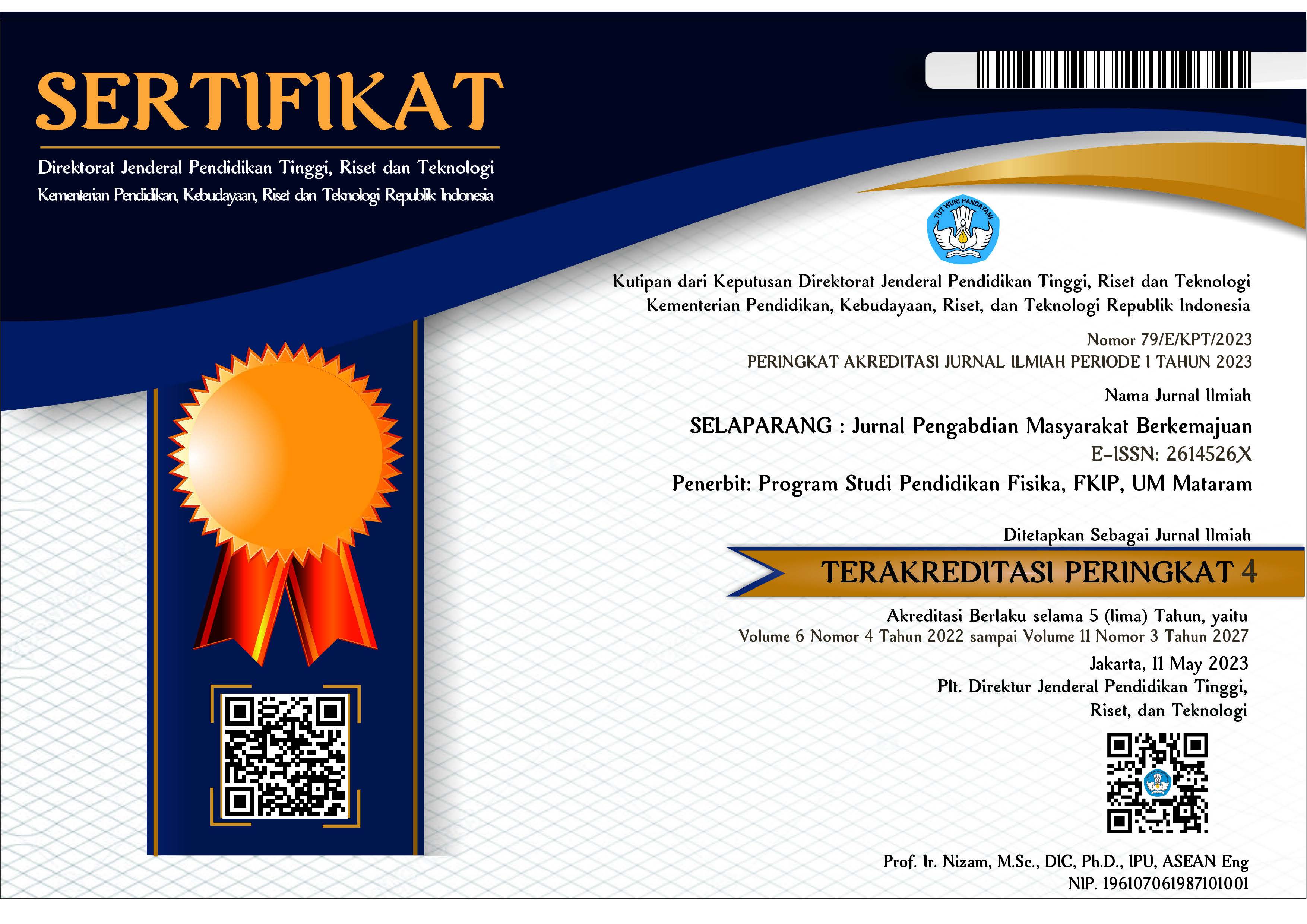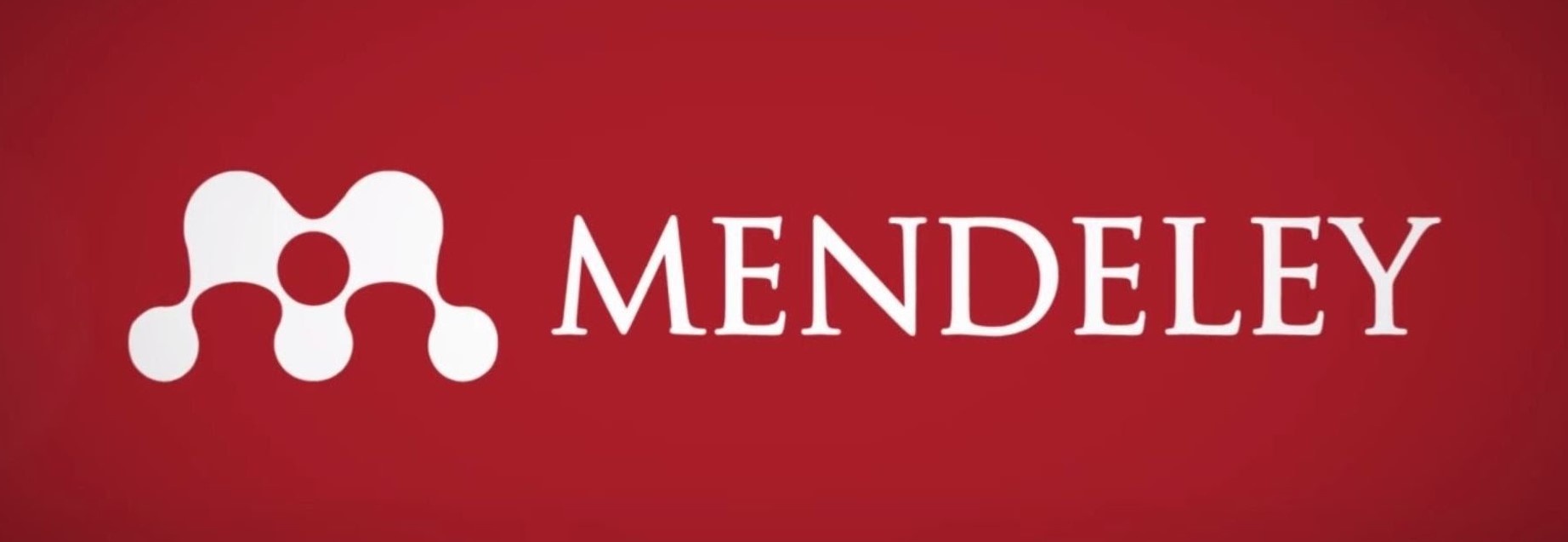SOSIALISASI PENGELOLAAN SAMPAH DENGAN PENDEKATAN REDUCE, REUSE, DAN RECYCLE (3R) BAGI PESERTA DIDIK DI SMPN NEONBAT KEFAMENANU
Abstract
ABSTRAK
Salah satu dampak negatif dari kegiatan pembangunan adalah permasalahan lingkungan. Permasalahan lingkungan yang selalu ditemukan di sekitar kita adalah sampah. Sampah dapat dikelola dengan pendekatan 3R (reduce, reuse, recycle). Pengelolaan sampah dengan pendekatan 3R perlu disosialisasikan kepada semua pihak terutama peserta didik. Sosialisasi pengelolaan sampah dengan pendekatan 3R dilaksanakan dalam bentuk kegiatan pengabdian pada masyarakat ini berlokasi di SMPN Neonbat Kefamenanu. Tujuan pengabdian ini adalah memberi pemahaman pada peserta didik mengenai pentingnya pengelolaan sampah di lingkungan serta untuk meningkatkan pemahaman peserta didik mengenai jenis sampah organik dan anorganik. Metode kegiatan pengabdian yang digunakan adalah permainan dan pembuatan produk kreasi dari sampah. Hasil tes akhir menunjukkan bahwa terdapat peningkatan pemahaman peserta didik tentang pengelompokkan sampah organik dan anorganik. Sosialisasi pengelolaan sampah dengan pendekatan 3R pada peserta didik SMPN Neonbat telah memberi dampak positif dengan meningkatnya pemahaman mengenai pengelompokan sampah organik dan anorganik serta memberikan pemahaman kepada peserta didik bahwa sampah yang dihasilkan bisa dimanfaatkan kembali dan dapat bernilai ekonomis apabila dikembangkan menjadi sebuah produk bermanfaat.
Kata kunci: sampah organik; sampah anorganik; 3R (reduce, reuse, recycle).
ABSTRACT
One of the negative impacts of development activities is environmental problems. Environmental problems that are always found around us are garbage. Waste can be managed with a 3R approach (reduce, reuse, recycle). Waste management with the 3R approach needs to be socialized to all parties, especially students. The socialization of waste management with the 3R approach was carried out in the form of community service activities located at SMPN Neonbat Kefamenanu. The purpose of this service is to provide students with an understanding of the importance of waste management in the environment and to increase students' understanding of the types of organic and inorganic waste. The method of service activities used are games and the manufacture of creative products from waste. The final test results show that there is an increase in students' understanding of the grouping of organic and inorganic waste. Socialization of waste management with the 3R approach to students of SMPN Neonbat has had a positive impact by increasing understanding of the grouping of organic and inorganic waste and providing understanding to students that the waste produced can be reused and can be of economic value if it is developed into a useful product.
Keywords: organic waste; inorganic waste; 3R (reduce, reuse, recycle).
Keywords
Full Text:
PDFReferences
Ademola, K. (2016). Problem – Based Instructional Strategy and Numerical Ability as Determinants of Senior Secondary Achievement in Mathematics, 7(13), 89–95.
Akinmola. (2014). Developing Mathematical Problem Solving Ability : A Panacea for A Sustainable Development In The 21 Century. Ijern, 2(2), 1–8.
Artiningsih, NKA. (2008). Peran Serta Masyarakat Dalam Pengeloaan Sampah Rumah Tangga. Semarang: Universitas Diponegoro
Cahyono & Masykuri. (2016). Kontribusi Kemampuan Numerik dan Kreativitas Terhadap Prestasi Belajar Siswa Pada Materi Pokok Hidrolisis Kelas XI MIA dan XI MIA 5 SMA Negeri 2 Karanganyar Tahun Pelajaran 2015/2016. Jurnal Pendidikan Kimia (JPK).
Carter, P. (2005). The Complete Book of Intelligence Tests.
Cohen, R., Dowker, A., Heine, A., Kaufmann, L., & Kucian, K. (2013). Trends in Neuroscience and Education Interventions for improving numerical abilities : Present and future. Trends in Neuroscience and Education, 2(2), 85–93. https://doi.org/10.1016/j.tine.2013.04.001
Cragg, L., & Gilmore, C. (2014). Trends in Neuroscience and Education Skills underlying mathematics : The role of executive function in the development of mathematics pro fi ciency, 3, 63–68. https://doi.org/10.1016/j.tine.2013.12.001
Damanhuri, E., Padmi. (2010). Diktat Sampah. Retrieved from https://www.google.com/search?q=diktat+sampah&oq=diktat+sampah&aqs=chrome..69i57.19793j0j4&sourceid=chrome&ie=UT F-8 (accessed 7.12.19).
Fazio, L. K., Bailey, D. H., Thompson, C. A., & Siegler, R. S. (2014). Journal of Experimental Child Relations of different types of numerical magnitude representations to each other and to mathematics achievement. Journal of experimental child psychology, 123, 53–72. https://doi.org/10.1016/j.jecp.2014.01.013
Kustiasih, T., Setyawati, L.M., Anggraeni, F., Darwati, S., Aryenti, A. (2014). Faktor Penentu Emisi Gas Rumah Kaca dalam Pengelolaan Sampah Perkotaan.J.Permukim.9,78–90. https://doi.org/10.31815/jp.2014.9.78-90
Makur, A. P., Prahmana, R. C. I., & Gunur, B. (2019). How mathematics attitude of mothers in rural area affects their children’s achievement. Journal of Physics: Conference Series, 1188(1). https://doi.org/10.1088/1742-6596/1188/1/012009
Republik Indonesia. (2012). Peraturan Pemerintah Republik Indonesia Nomor 81 Tahun 2012 Tentang Pengelolaan Sampah Rumah Tangga Dan Sampah Sejenis Sampah Rumah Tangga. Retrieved from http://peraturan.go.id/peraturan/view.html?id=11e44c4f5abfae60b478313 232303433 (accessed 7.19.19).
Republik Indonesia. (2008). Undang-Undang Republik Indonesia Nomor 18 Tahun 2008 Tentang Pengelolaan Sampah. Retrieved from https://jdih.setneg.go.id/ (accessed 7.18.19).
Suparmini, Sriadi Setyawati, Dyah Respati Suryo Sumunar dan Nurul Khotimah. (2014). Pelatihan Pengelolaan Sampah Anorganik Menjadi Aneka Kreasi Daur Ulang bagi Ibu Rumah Tangga dan Remaja Putri di Desa Trimulyo Kecamatan Jetis Kabupaten Bantul.Yogyakarta : Universitas Negeri Yogyakarta.
Taufiq Agus dan Maulana, M. Fajar. (2015). Sosialisasi sampah organik dan non organik serta pelatihan kreasi sampah. Jurnal Inovasi dan Kewirausahaan. 4 (68-73).
Hariyanto, H. (2014). Pengelolaan Sampah Di Kota Semarang Untuk Menuju Kota Bersih. Jurnal Geografi: Media Informasi Pengembangan dan Profesi Kegeografian, 11(2), 237-246.
Mardiana, S., Berthanilla, R., Marthalena, M., & Rasyid, M. R. (2019). Peningkatan pengetahuan masyarakat mengenai pengelolaan pembuangan dan pemilahan sampah rumah tangga di Kelurahan Kaligandu Kota Serang. BANTENESE: JURNAL PENGABDIAN MASYARAKAT, 1(2), 7 (9-8)
DOI: https://doi.org/10.31764/jpmb.v6i4.11159
Refbacks
- There are currently no refbacks.

This work is licensed under a Creative Commons Attribution-ShareAlike 4.0 International License.
______________________________________________________
Jurnal Selaparang
p-ISSN 2614-5251 || e-ISSN 2614-526X
EDITORIAL OFFICE:



















